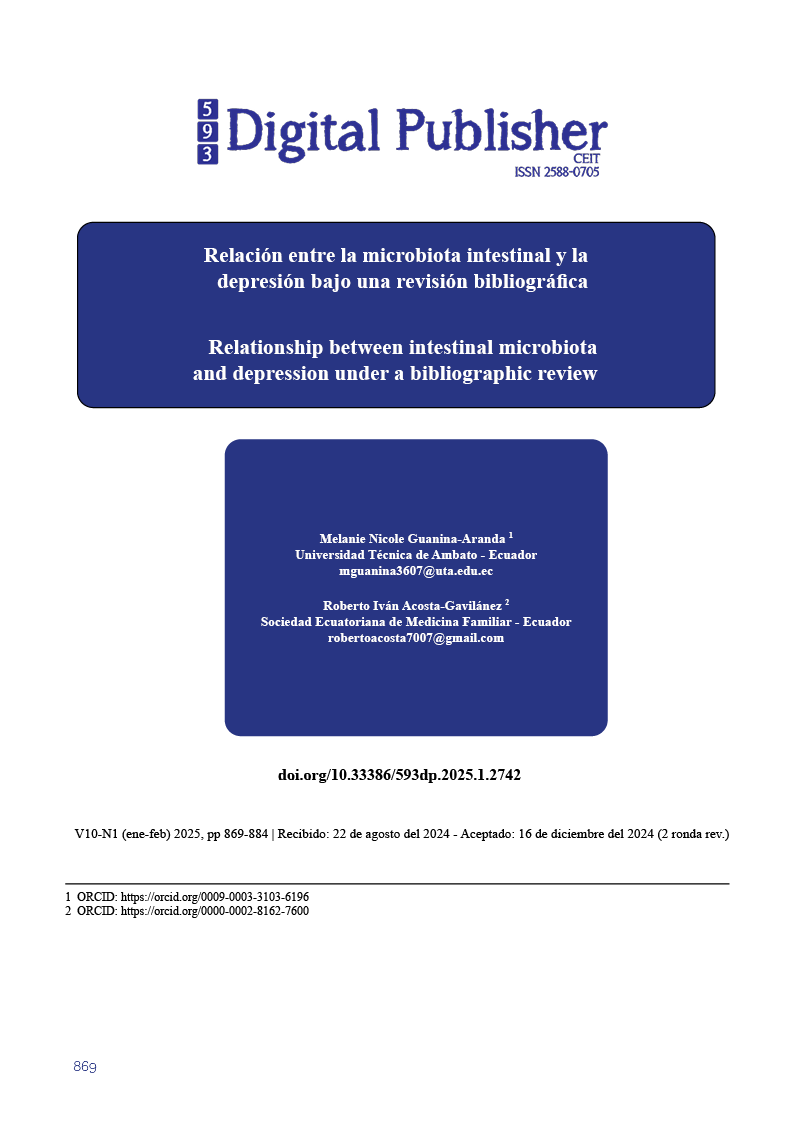Relationship between intestinal microbiota and depression under a bibliographic review
Main Article Content
Abstract
Depression is a mental disorder that affects behavior and thoughts, and limits the person's ability to interact socially and carry out daily activities, altering their lifestyle. Objective: Develop a framework that explains the influence of the intestinal microbiota on depression. Methodology: A review of the conceptual literature was carried out by searching scientific databases, analyzing systematic and conceptual reviews and meta-analyses that were included in the study under the selection of inclusion and exclusion criteria. Results: It was shown that the relationship between the intestinal microbiota and depression was investigated starting in the 17th century. The intestine is innervated by the enteric nervous system, which corresponds to a set of neurons within the gastrointestinal wall responsible for basic functions such as the secretion of digestive enzymes and hormones, motility, nutrient absorption and regulation of blood flow. The synthesis of neurotransmitters corresponds to a process that has currently been related to the intestinal microbiota. The discovery of the relationship between the intestinal microbiota and its incidence in depression has been one of the pillars for treatment. An alternative has been the inclusion of the use of probiotics, due to the capacity of some strains such as lactobacillus and bifidobacterium that intervene in the biosynthesis of neurotransmitters such as serotonin, dopamine, norepinephrine, which are responsible for regulating the state of patient mood. Concludes: Elements such as the vagus nerve and the metabolization of amino acid precursors such as tyrosine and tryptophan that are a product of the intervention of the intestinal microbiota are key intermediaries in the relationship between the microbiota and depression and therapeutic strategies, such as The use of probiotics and dietary changes have shown benefits in reducing depressive symptoms.
Downloads
Article Details

This work is licensed under a Creative Commons Attribution-NonCommercial-ShareAlike 4.0 International License.
1. Derechos de autor
Las obras que se publican en 593 Digital Publisher CEIT están sujetas a los siguientes términos:
1.1. 593 Digital Publisher CEIT, conserva los derechos patrimoniales (copyright) de las obras publicadas, favorece y permite la reutilización de las mismas bajo la licencia Licencia Creative Commons 4.0 de Reconocimiento-NoComercial-CompartirIgual 4.0, por lo cual se pueden copiar, usar, difundir, transmitir y exponer públicamente, siempre que:
1.1.a. Se cite la autoría y fuente original de su publicación (revista, editorial, URL).
1.1.b. No se usen para fines comerciales u onerosos.
1.1.c. Se mencione la existencia y especificaciones de esta licencia de uso.
References
Aragonés, E. (2020). Determinación de serotonina plasmática y otros neurotransmisores en el diagnóstico de la depresión: Evidencia y falsedades. FMC - Formación Médica Continuada en Atención Primaria, 27(3), 131-133. https://doi.org/10.1016/j.fmc.2019.07.009
Arroyo, K. I. M., & Rengifo, R. del P. S. (2019). Esquemas maladaptativos tempranos y depresión en pacientes jóvenes hospitalizados. Avances en Psicología, 27(2), Article 2. https://doi.org/10.33539/avpsicol.2019.v27n2.1797
Balseca, M., Serrano, E., Aguilera, J., Martínez, F., & Mora, M. (2019). Transtornos mentales, relación con funcionalidad y estructura familiar en parroquias rurales de Cuenca. Revista Médica Ateneo, 21(2), 55-66.
Barandouzi, Z. A., Starkweather, A. R., Henderson, W. A., Gyamfi, A., & Cong, X. S. (2020). Altered Composition of Gut Microbiota in Depression: A Systematic Review. Frontiers in Psychiatry, 11, 541. https://doi.org/10.3389/fpsyt.2020.00541
Bustos Fernández, L. M., Hanna Jairala, I., Bustos Fernández, L. M., & Hanna Jairala, I. (2022). Eje cerebro intestino microbiota. Importancia en la práctica clínica. Revista de Gastroenterología del Perú, 42(2), 106-116. https://doi.org/10.47892/rgp.2022.422.1438
Bustos-Fernández, L. M., Hanna-Jairala, I., Bustos-Fernández, L. M., & Hanna-Jairala, I. (2022). Eje cerebro intestino microbiota. Importancia en la práctica clínica. Revista de Gastroenterología del Perú, 42(2), 106-116. https://doi.org/10.47892/rgp.2022.422.1438
Castañeda, C. (2020). Microbiota intestinal y trastornos del comportamiento mental. Revista Cubana de Pediatría, 92(2). http://scielo.sld.cu/scielo.php?script=sci_abstract&pid=S0034-75312020000200016&lng=es&nrm=iso&tlng=es
Castillo Álvarez, F., & Marzo Sola, M. E. (2022). Papel de la microbiota intestinal en el desarrollo de diferentes enfermedades neurológicas. Neurología, 37(6), 492-498. https://doi.org/10.1016/j.nrl.2019.03.017
Castillo Hernández, J. P., & Chalco Calle, D. F. (2023). Uso de los probióticos como tratamiento de síntomas intestinales causados por depresión: Use of probiotics as treatment of intestinal symptoms caused by depression. LATAM Revista Latinoamericana de Ciencias Sociales y Humanidades, 4(2). https://doi.org/10.56712/latam.v4i2.617
Celis Sierra, M. (2022). A vueltas con la hipótesis bioquímica de la depresión: Bilis negra y serotonina. Clínica Contemporánea, 13. https://doi.org/10.5093/cc2022a22
Chahwan, B., Kwan, S., Isik, A., Van Hemert, S., Burke, C., & Roberts, L. (2019). Gut feelings: A randomised, triple-blind, placebo-controlled trial of probiotics for depressive symptoms. Journal of Affective Disorders, 253, 317-326. https://doi.org/10.1016/j.jad.2019.04.097
Chen, H. M., Kuo, P. H., Hsu, C. Y., Chiu, Y. H., Liu, Y. W., Lu, M. L., & Chen, C. H. (2021). Psychophysiological Effects of Lactobacillus plantarum PS128 in Patients with Major Depressive Disorder: A Preliminary 8-Week Open Trial. Nutrients, 13(11), 3731. https://doi.org/10.3390/nu13113731
Chen, Y., Xu, J., & Chen, Y. (2021). Regulation of Neurotransmitters by the Gut Microbiota and Effects on Cognition in Neurological Disorders. Nutrients, 13(6), 2099. https://doi.org/10.3390/nu13062099
Chin Fatt, C. R., Asbury, S., Jha, M. K., Minhajuddin, A., Sethuram, S., Mayes, T., Kennedy, S. H., Foster, J. A., & Trivedi, M. H. (2023). Leveraging the microbiome to understand clinical heterogeneity in depression: Findings from the T-RAD study. Translational Psychiatry, 13(1), 1-11. https://doi.org/10.1038/s41398-023-02416-3
Choi, W., Kang, H.-J., Kim, J.-W., Kim, H. K., Kang, H.-C., Lee, J.-Y., Kim, S.-W., Stewart, R., & Kim, J.-M. (2022). Associations of Serum Serotonin Levels with 12-week and 12-month Remission in Patients with Depressive Disorders. Clinical Psychopharmacology and Neuroscience, 20(2), 248-258. https://doi.org/10.9758/cpn.2022.20.2.248
Erazo, M., & Fors, M. (2020). Depresión: Una experiencia del Hospital de Adulto mayor, Quito, Ecuador, 2018. Bionatura, 5(3), 1-7. http://dx.doi.org/10.21931/RB/2020.05.03.11
Gao, J., Zhao, L., Cheng, Y., Lei, W., Wang, Y., Liu, X., Zheng, N., Shao, L., Chen, X., Sun, Y., Ling, Z., & Xu, W. (2023). Probiotics for the treatment of depression and its comorbidities: A systemic review. Frontiers in Cellular and Infection Microbiology, 13. https://www.frontiersin.org/articles/10.3389/fcimb.2023.1167116
Garza Velasco, R., Garza Manero, S. P., & Perea Mejía, L. M. (2021). Microbiota intestinal: Aliada fundamental del organismo humano. Gut microbiota: our fundamental allied. Educación Química, 32(1), 10. https://doi.org/10.22201/fq.18708404e.2021.1.75734
Gómez, M., Ramón, J., Pérez, L., & Blanco, J. (2019). El eje microbiota-intestino-cerebro y sus grandes proyecciones. Revista Neurología, 68(3). https://doi.org/10.33588/rn.6803.2018223
Góralczyk Bińkowska, A., Szmajda Krygier, D., & Kozłowska, E. (2022). The Microbiota–Gut–Brain Axis in Psychiatric Disorders. International Journal of Molecular Sciences, 23(19), 11245. https://doi.org/10.3390/ijms231911245
Halemani, K., Shetty, A. P., Thimmappa, L., Issac, A., Dhiraaj, S., Radha, K., Mishra, P., & Mathias, E. G. (2023). Impact of probiotic on anxiety and depression symptoms in pregnant and lactating women and microbiota of infants: A systematic review and meta-analysis. Journal of Global Health, 13, 04038. https://doi.org/10.7189/jogh.13.04038
Hu, X., Li, Y., Wu, J., Zhang, H., Huang, Y., Tan, X., Wen, L., Zhou, X., Xie, P., Olasunkanmi, O. I., Zhou, J., Sun, Z., Liu, M., Zhang, G., Yang, J., Zheng, P., & Xie, P. (2023). Changes of gut microbiota reflect the severity of major depressive disorder: A cross sectional study. Translational Psychiatry, 13(1), 1-9. https://doi.org/10.1038/s41398-023-02436-z
Matos, A., & Manzano, G. (2021). Bases neurológicas de la depresión. Analogías del Comportamiento, 19, Article 19. https://revistasenlinea.saber.ucab.edu.ve/index.php/analogias/article/view/5165
McGuinness, A. J., Davis, J. A., Dawson, S. L., Loughman, A., Collier, F., O’Hely, M., Simpson, C. A., Green, J., Marx, W., Hair, C., Guest, G., Mohebbi, M., Berk, M., Stupart, D., Watters, D., & Jacka, F. N. (2022). A systematic review of gut microbiota composition in observational studies of major depressive disorder, bipolar disorder and schizophrenia. Molecular Psychiatry, 27(4), 1920-1935. https://doi.org/10.1038/s41380-022-01456-3
Miller, I. (2018). The gut–brain axis: Historical reflections. Microbial Ecology in Health and Disease, 29(2), 1542921. https://doi.org/10.1080/16512235.2018.1542921
Ministerio de Salud Pública. (2023). MSP brindó en 2023 más de 113 mil atenciones para trastornos depresivos desde un enfoque integral – Ministerio de Salud Pública. https://www.salud.gob.ec/msp-brindo-en-2023-mas-de-113-mil-atenciones-para-trastornos-depresivos-desde-un-enfoque-integral/
Ministerio de Salud Pública. (2024). Este 7 de abril se celebra el Día Mundial de la Salud, con el tema “Depresión: Hablemos” [Gubernamental]. Ministerio de Salud Pública. https://www.salud.gob.ec/este-7-de-abril-se-celebra-el-dia-mundial-de-la-salud-con-el-tema-depresion-hablemos/
Moreno Sepúlveda, J., Capponi, M., Moreno Sepúlveda, J., & Capponi, M. (2020). Dieta baja en carbohidratos y dieta cetogénica: Impacto en enfermedades metabólicas y reproductivas. Revista médica de Chile, 148(11), 1630-1639. https://doi.org/10.4067/S0034-98872020001101630
Ng, Q. X., Lim, Y. L., Yaow, C. Y. L., Ng, W. K., Thumboo, J., & Liew, T. M. (2023). Effect of Probiotic Supplementation on Gut Microbiota in Patients with Major Depressive Disorders: A Systematic Review. Nutrients, 15(6), 1351. https://doi.org/10.3390/nu15061351
Organización Mundial de la Salud. (2023). Depresión [Organización Mundial de la Salud]. Organización Mundial de la Salud. https://www.who.int/es/news-room/fact-sheets/detail/depression
Organización Panamericana de la Salud. (2020). La carga de los transtornos mentales en la región de las Américas. Organización Panamericana de la Salud, 1-2.
Oteíza Collante, M., Méndez, I., Santamarina Pérez, P., Romero, S., Oteíza Collante, M., Méndez, I., Santamarina-Pérez, P., & Romero, S. (2023). Los trastornos depresivos de la infancia y la adolescencia. Principales signos de alerta. Orientación para el tratamiento. Pediatría Atención Primaria, 25(97), 83-93.
Pan American Life. (2022). Salud Mental en América Latina y el Caribe: La Pandemia Silenciosa. https://www.palig.com/Media/Default/Documents/Salud%20Mental%20White%20Paper%20PALIG.pdf
Parletta, N., Zarnowiecki, D., Cho, J., Wilson, A., Bogomolova, S., Villani, A., Itsiopoulos, C., Niyonsenga, T., Blunden, S., Meyer, B., Segal, L., Baune, B. T., & O’Dea, K. (2019). A Mediterranean-style dietary intervention supplemented with fish oil improves diet quality and mental health in people with depression: A randomized controlled trial (HELFIMED). Nutritional Neuroscience, 22(7), 474-487. https://doi.org/10.1080/1028415X.2017.1411320
Pomilio, A. B., Ollivier, J. O. C., Vitale, A. A., Fernández, T. O., & Vitale, M. G. (2022). Bases neuroquímicas de la transmetilación aberrante de neuroaminas y su relación con el metabolismo de la vitamina B12 y el ácido fólico. Acta Bioquímica Clínica Latinoamericana, 56(4), 433-468.
Quizhpe Fernández, D. D. Q., & Rosero Viteri, I. A. R. (2023). Dieta cetogénica y su influencia en el tratamiento de la epilepsia refractaria infantil. Vive Revista de Salud, 6(16), 286-298. https://doi.org/10.33996/revistavive.v6i16.226
Real López, M., Peraire, M., Ramos Vidal, C., Nath, D., Hervás, E., & Cortés, X. (2021). Implicación de la disbiosis intestinal en la etiopatogenia y el tratamiento del trastorno del espectro autista: Una revisión bibliográfica. Revista Neurología, 73(8). https://doi.org/Revista Neurología
Remes, O., Mendes, J. F., & Templeton, P. (2021). Biological, Psychological, and Social Determinants of Depression: A Review of Recent Literature. Brain Sciences, 11(12). https://doi.org/10.3390/brainsci11121633
Rodríguez Carrillo, J. C., & Ibarra, M. (2019). Depresión y otros trastornos afectivos en la enfermedad de Parkinson. Acta Neurológica Colombiana, 35, 53-62. https://doi.org/10.22379/24224022250
Sanz, J., García-Vera, M. P., Sanz, J., & García-Vera, M. P. (2020). Las ideas equivocadas sobre la depresión infantil y adolescente y su tratamiento. Clínica y Salud, 31(1), 55-65. https://doi.org/10.5093/clysa2020a4
Serrano García, A., Montánchez Mateo, J., Franch Pato, C. M., Gómez Martínez, R., García Vázquez, P., & González Rodríguez, I. (2021). Relación entre los niveles de interleucina 6 y depresión en pacientes afectados por Covid-19. Medicina Clinica, 156(7), 332-335. https://doi.org/10.1016/j.medcli.2020.11.010
Socała, K., Doboszewska, U., Szopa, A., Serefko, A., Włodarczyk, M., Zielińska, A., Poleszak, E., Fichna, J., & Wlaź, P. (2021). The role of microbiota-gut-brain axis in neuropsychiatric and neurological disorders. Pharmacological Research, 172, 105840. https://doi.org/10.1016/j.phrs.2021.105840
Teleanu, R. I., Niculescu, A.-G., Roza, E., Vladâcenco, O., Grumezescu, A. M., & Teleanu, D. M. (2022). Neurotransmitters—Key Factors in Neurological and Neurodegenerative Disorders of the Central Nervous System. International Journal of Molecular Sciences, 23(11), Article 11. https://doi.org/10.3390/ijms23115954
Wagner, J. L. (2022). The vagus nerve: Current concepts in anaesthesia and ICU management. Southern African Journal of Anaesthesia and Analgesia, 28(5), 193-197. https://doi.org/10.36303/SAJAA.2022.28.5.2811



